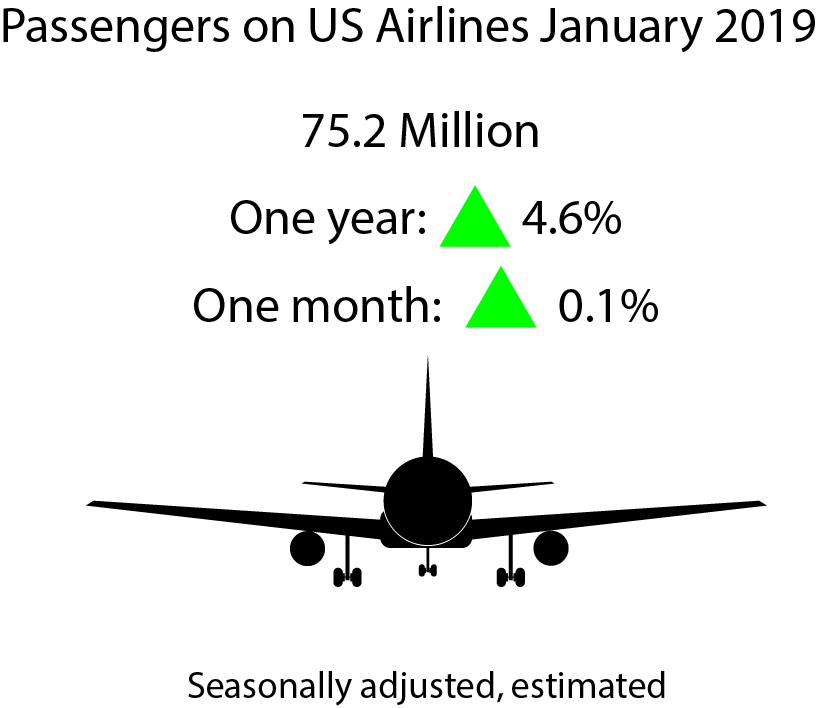Estimated January 2019 U.S. Airline Traffic Data

U.S. airlines’ carried an estimated 75.2 million systemwide (domestic and international) scheduled service passengers, seasonally-adjusted, in January 2019, up 0.1 percent from the December estimate, according to a Bureau of Transportation Statistics’ (BTS) first estimate.
BTS estimates that the January enplanement total of 75.2 million is the second highest all-time monthly total, down 0.8 percent from 75.8 million in July 2018.
The January air traffic estimate released today is a statistical estimate based on U.S. airlines reported data through November. BTS will release a second forecast of U.S. airlines’ January air traffic on March 14, followed by a release of the reported data on April 11.
Seasonally-adjusted changes
Estimated January 2019 systemwide passengers (75.2M), domestic passengers (65.8M) and international passengers (9.38M) compared to:
Previous Month from December 2018 Estimate:
Previous Year from January 2018 Reported:
Three Years Previous from January 2016 Reported:
Unadjusted Estimate: Systemwide, domestic and international enplanements all reached estimated highs for the month of January compared to reported data for previous years.
For the December and January estimates and for data filed through November, see accompanying tables. For the complete database of reported data, see Traffic.
Additional Bureau of Transportation Statistics (BTS) air traffic data:
Seasonally-adjusted
New seasonally-adjusted all-time highs in January 2019
Available seat-miles: Systemwide, domestic, and international available seat miles (ASMs) reached new estimated seasonally-adjusted all-time highs compared to reported data through November.
Load Factor
Load factor is a measure of the use of aircraft capacity that compares the system use, measured in RPMs as a proportion of system capacity, measured ASMs.
The estimated seasonally-adjusted load factor rose from December (83.6) to January (83.7) because estimated passenger travel grew faster (0.3 percent increase in RPMs) than estimated system capacity (0.2 percent increase in ASMs).
Seasonally-adjusted trends are for the time period January 2000 to present based on data reported by U.S. airlines through November and BTS estimates for the two most recent months. Additional data, including domestic and international numbers, can be found on the seasonally-adjusted data page.
Unadjusted Trends
Estimated January unadjusted all-time highs
Unadjusted passenger enplanements: Estimated systemwide, domestic, and international passenger enplanements reached new highs for the month of January compared to reported data for previous years.
Estimated January 2019 systemwide passengers (68.1M), domestic passengers (59.1M) and international passengers (8.94M) compared to:
Previous Month from December 2018 Estimate:
Previous Year from January 2018 Reported:
Three Years from Previous January 2016 Reported:
Unadjusted revenue passenger-miles: Systemwide, domestic, and international revenue passenger miles (RPMs) reached new estimated highs for the month of January compared to reported data for previous years.
Unadjusted available seat-miles: Systemwide, domestic, and international available seat miles (ASMs) reached new estimated highs for the month of January compared to reported data for previous years.
Load Factor:
Unadjusted load factor rose from the reported January 2018 (78.8) to the estimated January 2019 (79.7) because estimated passenger travel grew faster (6.0 percent increase in RPMs) than estimated system capacity (4.9 percent increase in ASMs).
Unadjusted trends are for the time period January 1996 to present based on data reported by U.S. airlines through November and BTS estimates for the two most recent months. Data through November are available at Customize Table. Reported data and estimates for the two most recent months can be downloaded from the seasonally-adjusted data page.
U.S. Airlines Reported Data for November
Seasonally Adjusted:
Reported November 2018 systemwide passengers (74.9M), domestic passengers (65.5M) and international passengers (9.35M) compared to:
Previous Month from October 2018:
Previous Year from November 2017:
Three Years Previous from November 2015:
Unadjusted: Systemwide, domestic, and international enplanements all reached all-time highs for the month of November.
Reported November 2018 systemwide passengers (72.7M), domestic passengers (64.6M) and international passengers (8.07M) compared to:
Previous Month from October 2018:
Previous Year from November 2017:
Three Years Previous from November 2015:
Explanation of estimates
Estimates derived from a forecast of the data. The first estimate is a two-month ahead forecast of the data. When an additional month of data become available, BTS uses the data to re-forecast the month and releases a second estimate. BTS performs the forecasting using the Census X-12 procedure in SAS – a statistical software program.
Explanation of seasonal adjustment
When the primary purpose is to examine monthly shifts in transportation services output and analyze short-term trends, the variation introduced by normal seasonal changes must be removed from the data. Transportation is highly seasonal, and without adjustment, the data do not give an accurate picture of underlying changes in aviation, passenger travel.
Seasonal adjustment of the data removes the seasonal events that follow a regular seasonal pattern. Changes that are not due to seasonality, such as a change in air travel resulting from economic conditions become more readily apparent.
The aviation data are seasonally adjusted for the effects of trading day, moving holidays, and data outliers.
See Seasonal Adjustment for methodology and additional explanation.
Reporting Notes
Data are compiled from monthly reports filed with BTS by commercial U.S. air carriers detailing operations, passenger traffic and freight traffic. This release includes data received by BTS from 68 U.S. carriers as of Feb. 7 for U.S. carrier scheduled civilian operations.
See the BTS Airlines and Airports page for additional scheduled service numbers through November for U.S. and foreign airlines. International data by origin and destination is available through August.
BTS has scheduled March 14 for the release of the first estimate of February air traffic data, the second estimate of the January air traffic data and reported data through December.
None of the data are from samples. Measures of statistical significance do not apply to the complete air traffic data.
